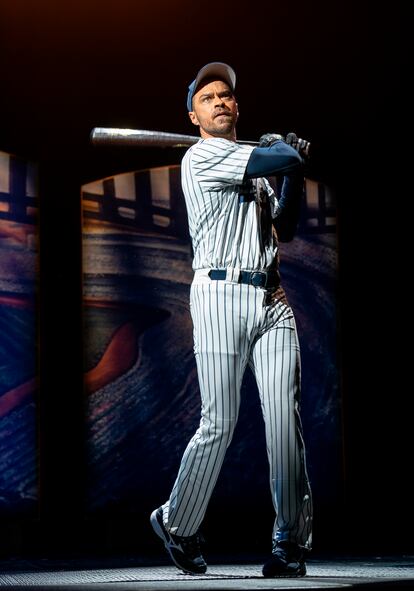Do not record the naked actor: a leak forces Broadway to crack down on audiences’ cell phones
A theater will film its spectators after videos of actor Jesse Williams’s nude scene in a new production appeared on social media


The same week that the Broadway play Take Me Out received four Tony Award nominations, the theater community has been sent abuzz by a leak: that of the full nude of the play’s star, Jesse Williams, recorded during a moment of the play on an audience member’s cell phone.
The actor, famous for his role as Dr. Jackson Avery in the series Grey’s Anatomy and one of the Tony nominees, stated last week that the stir around his nude appearance doesn’t faze him. But the viralization of the video has prompted the producer, Second Stage Theater, to take additional security measures during the performance, by installing cameras with an infrared system capable of detecting cell phone activity, as well as turning and zooming towards viewers in order to identify them.
The theater had already implemented other stringent security measures, including having audience members put their switched-off phones in cases with a magnetic padlock that is deactivated upon exit. The technique has been used for some time at comedy performances and concerts, although some viewers clearly manage to open the cases. As production director Peter Dean told The New York Times, those behind Take Me Out are discussing the protocol to follow in the event that the cameras detect someone using their phone: “We’re having discussions internally whether we would then stop the show, or send an usher or security when we see someone, to remove them,” he explained, stressing that the viewer in question would be asked to delete the material. In addition, Dean says, New York police would be called if necessary.

For theater producer Fernando de Luis-Orueta, from La Tropa Produce, “coercion against the use of mobile phones won’t go far.” “It is unrealistic for this to be the general solution for live shows, not only because it is expensive. I think it is a little more pleasant and subtle for the theater manager or the ushers to do that work,” he says in an interview with ICON. The producer gives as an example theaters’ experiences after the outbreak of the coronavirus: “In general, audience members have been great about masking. All of us who have gone to the theater during the pandemic have seen an usher approach someone about putting on a mask, without much trouble. The same thing with cellphones seems to me a much less invasive measure than more forceful options.”
Take Me Out is a 2002 play about a baseball player who decides to come out as gay. Most of the plot takes place in his team’s locker room throughout an entire season, showing the tensions, homophobia and support he experiences among a motley crew of teammates. The version starring Williams is not the first to be performed on Broadway: it was produced in 2003 with actor Daniel Sunjata, of whom, despite the much lower quality of the cameras on mobile phones at the time, a nude was also leaked.
Both the production company and the theater performers’ union, Actors’ Equity Association, have condemned the recording. “As actors, we regularly agree to be vulnerable onstage in order to tell difficult and challenging stories. This does not mean that we agree to have those vulnerable moments widely shared by anyone who feels like sneaking a recording device into the theater,” said President Kate Shindle. “Taking naked pictures of anyone without their consent is highly objectionable and can have severe legal consequences,” said Second Stage Theater.
The posting dilemma
It is unclear whether the leaked nude, along with previous rave reviews and the Tony Award recognition, has had an impact on ticket sales of Take Me Out, which opened last April and has been extended until June 11. De Luis-Orueta acknowledges that the theater and cellphones have an ambiguous relationship. “We have had problems for many years. There are actors who face very desperate situations that force them to cut the performance, or that make them lose concentration and forget the script. But we are not interested in restricting mobiles either. Many people share photos of the applause or the curtain on social networks, and that helps us a lot when it comes to promoting, so it is true that there is this tension,” he reflects.
The same week, the Argentine actor Ricardo Darín interrupted the premiere of his work Escenas de la vida conjugal at the Teatro del Soho Caixabank in Málaga, in southern Spain, shouting “Enough with the cellphones!,” followed by his exit from the stage and a half-minute pause. The Italian comedian Leo Bassi once snatched and stomped on the phone of an audience member who was speaking during his show, although the entertainer later was forced to pay a fee of €400. “At the movies, it is very annoying because of the light on the screen, but the projection does not stop. In the theater we talk about something else. I recently saw a performance that was almost ruined by a phone conversation,” says Luis-Orueta.
The recording of a nude, however, has other implications. In 2008, a nude image of Daniel Radcliffe, taken during his appearance in the play Equus, was leaked. The image sparked the wrath of author Peter Shaffer. Technician Rachel Juozapaitis accused the image thief of “turning art into pornography.” The play, however, was a huge success. Its run was also extended after the mere news of the then-19-year-old’s nude made a splash in the press.
“Mobile phones are obviously already an inseparable part of our lives. They are here to stay, and it is absurd to fight against that,” says Fernando de Luis-Orueta. “It is a very difficult challenge. In the end it is a matter of education and respect, awareness, for the spectators to understand that what is happening in front of them is ephemeral. But I think that raising awareness will always be the best option.”
Tu suscripción se está usando en otro dispositivo
¿Quieres añadir otro usuario a tu suscripción?
Si continúas leyendo en este dispositivo, no se podrá leer en el otro.
FlechaTu suscripción se está usando en otro dispositivo y solo puedes acceder a EL PAÍS desde un dispositivo a la vez.
Si quieres compartir tu cuenta, cambia tu suscripción a la modalidad Premium, así podrás añadir otro usuario. Cada uno accederá con su propia cuenta de email, lo que os permitirá personalizar vuestra experiencia en EL PAÍS.
¿Tienes una suscripción de empresa? Accede aquí para contratar más cuentas.
En el caso de no saber quién está usando tu cuenta, te recomendamos cambiar tu contraseña aquí.
Si decides continuar compartiendo tu cuenta, este mensaje se mostrará en tu dispositivo y en el de la otra persona que está usando tu cuenta de forma indefinida, afectando a tu experiencia de lectura. Puedes consultar aquí los términos y condiciones de la suscripción digital.








































